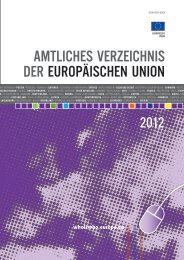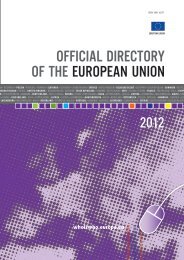Life Events - EU Bookshop - Europa
Life Events - EU Bookshop - Europa
Life Events - EU Bookshop - Europa
You also want an ePaper? Increase the reach of your titles
YUMPU automatically turns print PDFs into web optimized ePapers that Google loves.
By leading by example, government should aim<br />
to develop basic, re-usable, services that are<br />
both attractive for the private sector to build<br />
on and end-users to take up.<br />
Enabling such a development may lead to<br />
more user demand for these services, build up<br />
greater political commitment, and showcase a<br />
clear business case in which the private sector<br />
can collaborate.<br />
Service-oriented architecture: a key enabler<br />
In this study, the stakeholders interviewed held clear opinions about serviceoriented<br />
architecture. Th ey indicated that service-oriented architecture is the<br />
main approach that would enable a shift towards Gov 2.0 and the re-use of<br />
online eGovernment services. Th e study therefore went on to investigate in some<br />
depth the benefi ts of service-oriented architecture and a possible target service<br />
architecture.<br />
Service-oriented architecture is particularly<br />
suited to help government agencies deal with<br />
the obstacles that currently inhibit their service<br />
provision. A number of benefi ts are evident.<br />
Th e architecture can help governments to:<br />
implement new systems that enable them to<br />
modernise their business architecture, integrate<br />
agency service delivery, and share information<br />
across organisational boundaries. Th ey will also<br />
be enabled to: reduce costs by consolidating<br />
redundant application functionality.<br />
15 •••
















